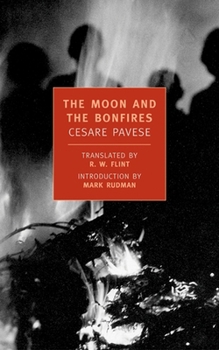The Moon and the Bonfires
Select Format
Select Condition 
Book Overview
Ristampa dell'edizione del 1950. Copertina flessibile. Cesare Pavese scrive La luna e i fal tra il 18 settembre e il 9 novembre del 1949. La luna e i fal e' il pi importante romanzo di Cesare Pavese... This description may be from another edition of this product.
Format:Paperback
Language:English
ISBN:1590170210
ISBN13:9781590170212
Release Date:October 2002
Publisher:New York Review of Books
Length:176 Pages
Weight:0.50 lbs.
Dimensions:0.5" x 5.0" x 8.1"
Customer Reviews
4 ratings
The eternal dilemma
Published by Thriftbooks.com User , 17 years ago
I have read this book many many years ago, and many many time. I was passionate about Pavese as a young adult. I 'forgave' him some even then rather politically incorrect view of the female universe. I would say that this was my favorite book of his. I'm a Italian woman, and a rather restless baby boomer. The message that I carry with me from the book is the unresolved choice between the moon and the bonfires. Is your life more complete and fulfilled if you travel to the moon and see the whole world? or the secret to a rich life is to stay faithfull to the bonfires - no matter how irrational - and never move out of the confinement of your valley? Flower revolution or traditionalism? A woman president or the Amish way of life? But it also reminds me of a short animation movie of the '70 where the 'camera' moved from the calm of a lake down to the dept of the athoms and back to the lake via the vast expansion of the universe. One and the same, the big and the small. There is no magic bullet, no sure bet, and no judgment to pass. I consider it a must read. I have to laugh... I even contemplate translating it when I could not get it in English for my Californian husband.
"I came through, even without a name."
Published by Thriftbooks.com User , 21 years ago
As the book opens, an unnamed narrator has returned, after twenty years, to the small Italian village in which he grew up, alone and unloved. A foundling abandoned on the cathedral steps, the narrator was brought up, for a fee, by a destitute farmer, who treated him more like a workhorse than a person with a soul. Eventually escaping as a youth to the United States, he worked his way to California, but when an accidental fortune leaves him "rich, big, fat, and free," he returns to Gaminella, where he confronts the harsh memories of his childhood and the even harsher wartime events which traumatized the town after he left. In cold, realistic, and unemotional prose, the author alternates bleak memories of the boy who was always an outsider with his observations about his later life in the U.S. and his growing awareness of the atrocities that happened in Gaminella during the war. As the speaker reconnects with the characters from his past, particularly Nuto, a friend and musician, he notes the sameness of their days, their lack of hope, and the emptiness at the heart of their lives. The speaker has always believed that "a town means not being alone, knowing that in the people, the trees, the soil, there is something of yourself, that even when you're not there it stays and waits for you," a belief which acquires enormous irony as the town's collusion in events during and after the war become clear and as bodies mysteriously surface.In language which is both understated and rigidly controlled, Pavese creates a world as bleak and cold as the moon, a world of secrets, a world in which there seem to be no dreams. His detached, almost off-handed presentation of horrors sets them in high relief and heightens their impact. Only when Pavese describes the attraction of the speaker to his employer's two daughters do we get a feeling that there's a heart beating within him, yet he remembers his "place," something which makes the daughters' fates doubly affecting and ironic for the reader. The moon and the bonfires, men and the land, nature and spirit, and ultimately life and death all combine here in a story about a small town, and, Pavese points out, "one needs a town, if only for the pleasure of leaving it." Mary Whipple
Returning home
Published by Thriftbooks.com User , 23 years ago
The masterpiece of one of the greater Italian writers of the twentieth century. The search of the own roots and the sense of the own life returning to the origin countryside after emigration in America. Also one meaningful testimony on Italy during and after the second world war (and on the point of view of an Italian on the U.S. in that time). Still today a book a lot being involved.
the reason why one wants to die
Published by Thriftbooks.com User , 25 years ago
i came across the book because i was reading some material on jean-luc godard, from which i learnt that godard read pavese's work, so i got the book from the library... i really don't know how to say anything about the book, but it certainly is one of the few books that really touched me... the protagonist's nostalgic sadness on reflecting his childhood and its innocent charm, the solitude of (impossible) love were depicted as they were natural, natural but not natural enough for him to be at ease. the style is bare but this bareness proved to be great merit, it's like hou hsiao hsien's film





